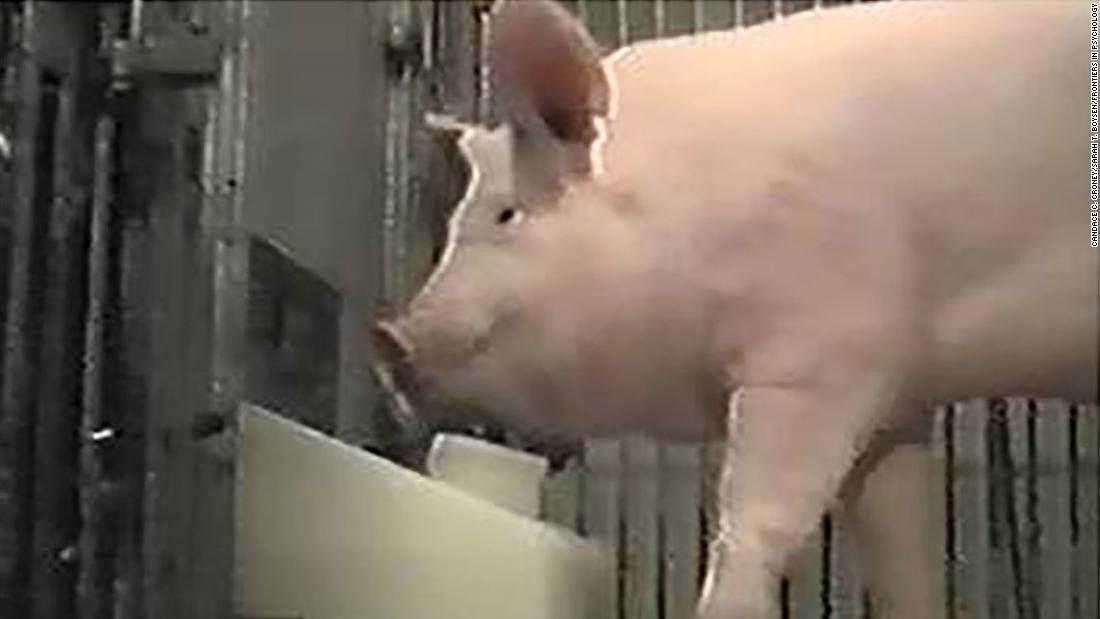Researchers at Purdue University in Indiana said they were able to train four pigs to perform a “joystick-operated video game task” to obtain treats.
The success rate of the pigs in the task was described by the researchers as “remarkable and indicative of their behavioral and cognitive flexibility”.
The animals – a pair of two-year-old Panepinto micro pigs and two three-month-old Yorkshire pigs – were trained to manipulate a joystick to control a cursor on a computer monitor, the researchers said in a study published Thursday.
This cursor can be used to hit three targets – of varying difficulty – on the screen. When the target was hit, an automatic pellet dispenser released the food.
Before the experiment, scientists at the university’s Center for Animal Welfare Science trained the pigs until they learned the behavior, using voice commands, simulated joysticks and hand-dispensed treats.
The animals had to approach a computer, which had “walls” – or thick blue digital lines – spread across the screen.
Then, they had to select one of the “walls” with the cursor to get a treat. As the accuracy of the pigs improved, the number of “walls” was reduced to two and then to one, making it more difficult.
Panepinto, Ebony and Ivory pigs performed well – 84% success rate – when presented to three-walled targets.
But a skill gap appeared between the two pigs as the number of targets was reduced, with Ivory able to hit targets from a wall 76% of the time, against 34% for Ebony.
Meanwhile, the Yorkshire pigs, Hamlet and Omelet, managed to complete the task “above chance” when presented to two walls or a single wall on the screen, but not when presented to three walls.
The researchers determined that “above chance” is beyond the targets that the pigs could have hit, randomly.
The pigs spent three to four months participating in the experiment.
‘Impressive learning capabilities’
The article’s authors, Candace C. Croney, professor of animal behavior and welfare and director of the university’s Center for Animal Welfare Science, and Sarah T. Boysen, senior researcher at the university, said the experiment suggests that animals have a understanding of the task.
“Acquiring the video task required conceptual understanding of the task, as well as skilled motor performance,” they said in the article.
Speaking to CNN, Croney said he hoped the newspaper would inspire more research on pigs’ cognitive abilities.
“It would be good for people to realize how unique pigs are and how much more sophisticated they can be mentally than we previously recognized,” she said.
She hoped the research would help people understand how best to “enrich” the lives of animals.
Commenting on the importance of the findings, Christian Nawroth, who was not involved in the study and is a researcher at the Leibniz Institute for Biology of Farm Animals in Germany, said the article demonstrated “the pigs’ impressive learning skills”.
“We already know that pigs are good problem solvers, but the ability to use a joystick to navigate a cursor on a screen is certainly something that hasn’t been on any farm animal’s list until now,” he told CNN, adding that the task that the pigs received “was not easy to solve”.
“We still underestimate the intelligence of pigs and farm animals in general. As this research path, farm animal cognition, is taking off, we will probably see more research on farm animals’ more sophisticated learning and cognitive skills in the years to come. , “he added.
The results were published in the journal Frontiers in Psychology.
